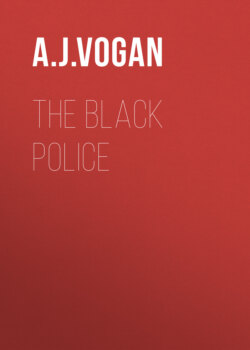Читать книгу The Black Police - A. J. Vogan - Страница 3
На сайте Литреса книга снята с продажи.
CHAPTER I.
A PENNY FOR BAD NEWS.
ОглавлениеTable of Contents
TAR! Ev-en’ Star! Full account o’ the fi-re!” echoes shrilly on all sides from the throats of bare-legged, paper-laden urchins, who after the manner of their kind are actively engaged in supplying the passing public of Auckland, New Zealand, with the second edition of the evening paper.
Queen Street, the principal thoroughfare of the city, is crowded at this hour of the afternoon. Business at the banks and offices is over for the day, and the hot pavements are crowded with homeward-bound pedestrians of many varieties. Pale-faced daughters of the city’s nouveaux riches are there by dozens. Many are accompanied by healthy-looking female cousins from the agricultural Waikato, and if the former do congratulate themselves at the contrast between their own gaudy plumes and their country relative’s more sober feathers, what of that? It is an odd fact too, worth mentioning, that these young ladies always require to do their shopping about this time in the day. But look at the crowd again. There stalks a stately Maori chief, with dark, tattooed, thoughtful face, surmounted with the incongruous “long-sleeved hat” of Europe. Others of his race are also there rubbing noses, and weeping with long-lost friends, or holding consultations with sharp-eyed lawyers, who, spider-like, are sucking the unfortunate natives’ ancestral estates into the insatiable and unscrupulous maws of pakeha landsharks.
On hurries the crowd, and somebody points out Auckland’s richest man. “Entirely devoted to Art,” says our informant, adding that the object of our attention “has found gin-spinning pay better than feeling the pulses of hypochondriacs.”
Bustling past comes a knot of loud-voiced, white-waistcoated mining agents. One of these turns for a moment to buy a paper. Like minnows at a worm, a shoal of newsboys make a dive at him, tumbling over each other, and crying aloud their alto battle-cry in the strange vernacular of their kind: “Star! Ev-en’ Star! Full account of the fi-re! Death of an Australian explorer!”
A young man, who with riding-whip in hand is standing close by on the curb, turns at the last sentence, and hurriedly buying a paper, glances eagerly at it.
“So it is true, after all,” he murmurs half aloud, and remains for a moment or two in deep thought. As we want our readers to know him when they meet him again, here is a brief description of Mr. Claude Angland. As he stands there before us in a loosely-fitting Norfolk jacket and Bedford cords, his dark-brown, wide-brimmed felt hat—light as gossamer—thrown back from his honest, sunburnt face, he looks the beau idéal of what an intelligent, active pioneer in a new country should be. Old ladies would call him “a fine young man to look at;” younger members of the female persuasion, although denying his right to be termed handsome, would naturally turn to him in trouble or in danger, in preference to many a more showy individual.
Our new friend does not stand long in thought; he suddenly glances again at the paper, and then at his watch, and turning on his heel is soon lost to view in the crowd.
The news that has apparently so interested the young man is in the latest telegrams’ column of the evening paper.
“(By special wire.)
“Cairns, Queensland.
“News has just been received from Georgetown confirmatory of wire sent you last week respecting death of Dr. Dyesart. Whilst exploring the country near the Mitchell river he met with a severe fall, and died three days afterwards. His sole companion, a black boy named Billy, who has accompanied him during all his later expeditions, reached Murdaro station with the news ten days since. An attempt will be made to find the body, when the boy, who was also badly hurt, is sufficiently recovered.”
In smaller type, below the telegram, a few brief editorial notes appeared eulogising the deceased explorer, and giving a short outline sketch of his life.
